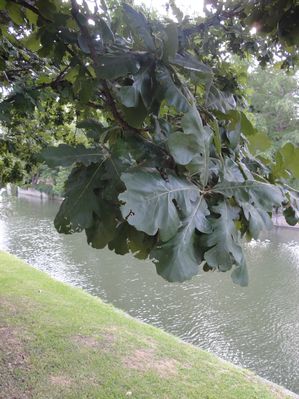Print This Page
Oak, Bur
Oak, Burr
Quercus macrocarpa
Bur Oak (also spelled Burr) is the most cold and drought tolerant of the oaks, able to thriveas far north as Alaska. A white oak, Bur Oak is a slow growing deciduous tree, averaging one foot per season. Naturally forms a wide open crown, growing wider than tall in the landscape, only starting to be taller than wide after reaching heights over 50 feet.
The deeply ridged bar is ash-gray to dark brown in color, with fissures getting deeper with age. Leaves can grow up to nine inches in length, narrow but with deep lobes at the base, becoming much wider at the end.
Bur Oak is monoecious, and blooms right after the leaves appear in the spring; yellow-green male catkins are up to four inches long, while female flowers are green and appear in short single spikes. The largest acorns of the oaks follow shortly thereafter – measuring up to two inches across. They are enclosed in a large cap with overlapping scales and sport an attractive fringe; it looks very much like the bur of a chestnut, giving this oak its name. Avoid planting Bur Oak in parking lots, as the acorns can damage vehicles.
 |
Shade Tree |
|
|
 |
Height:50-90 Feet
|
 |
Spread:35-40 Feet
|
 |
|
USDA Hardiness Zone 2a
Available Sizes:
| Item |
Description |
| OAK-BUR-30 |
#030 OAK, BURR |

|
| OAK-BUR-45 |
#045 OAK, BURR |

|
| OAK-BUR-95 |
#095 OAK, BURR |

|
| OAK-BUR-200 |
#200 OAK, BURR |

|
Characteristics & Attributes
|
Deer Tolerance
|
Exposure
|
Habit
|
Soil pH Preference
|
|
Water Needs
|
Texas Native
|





